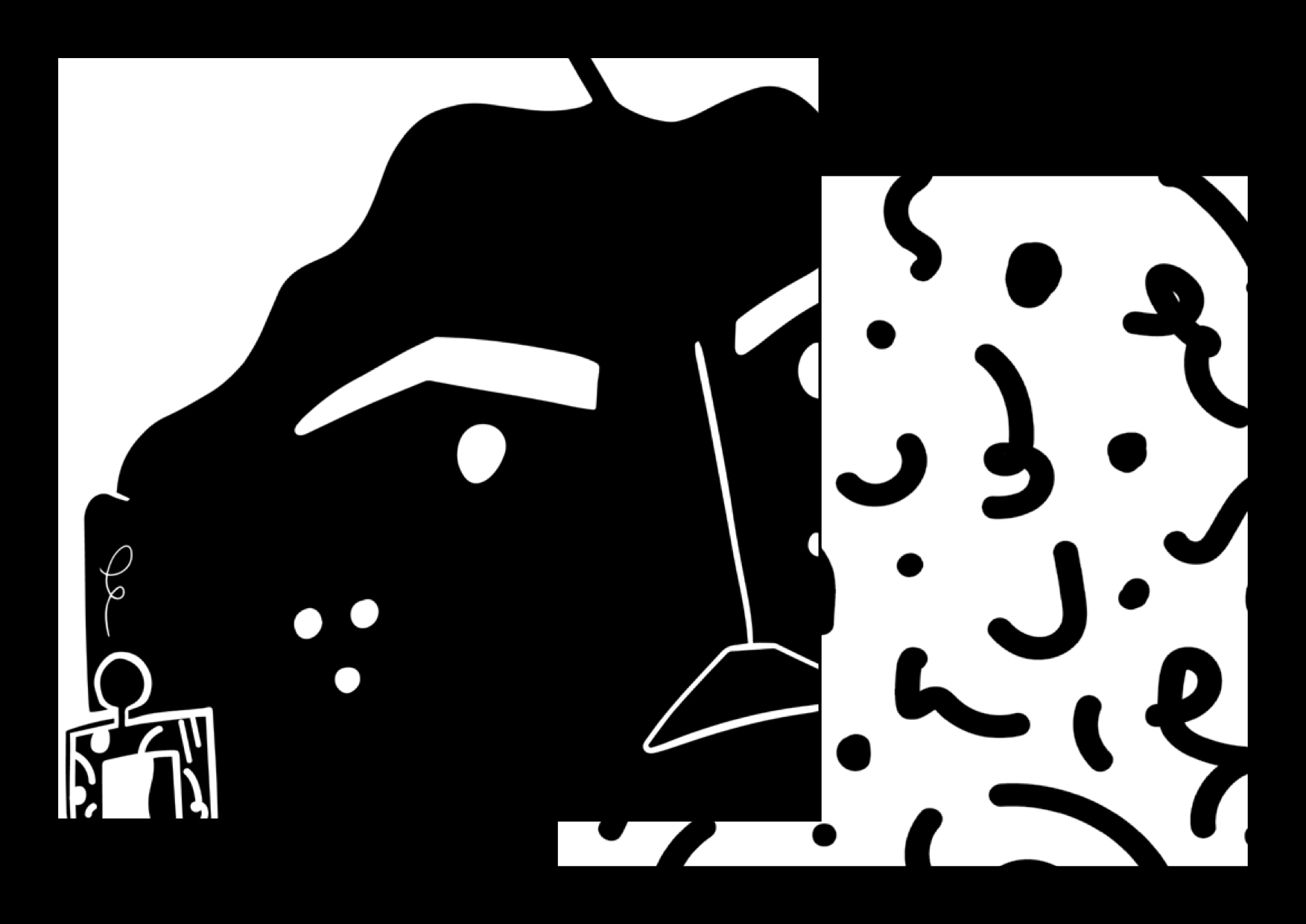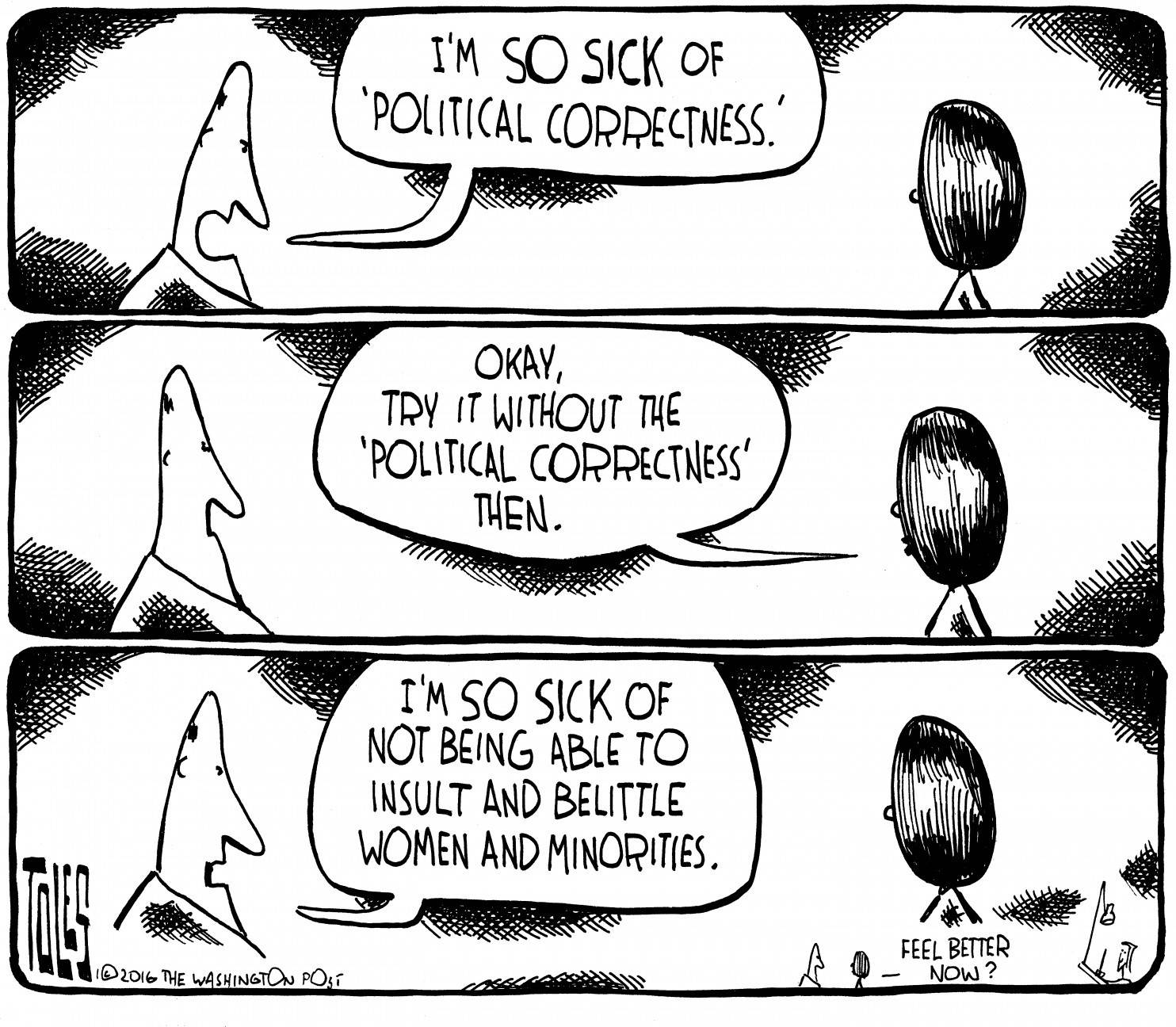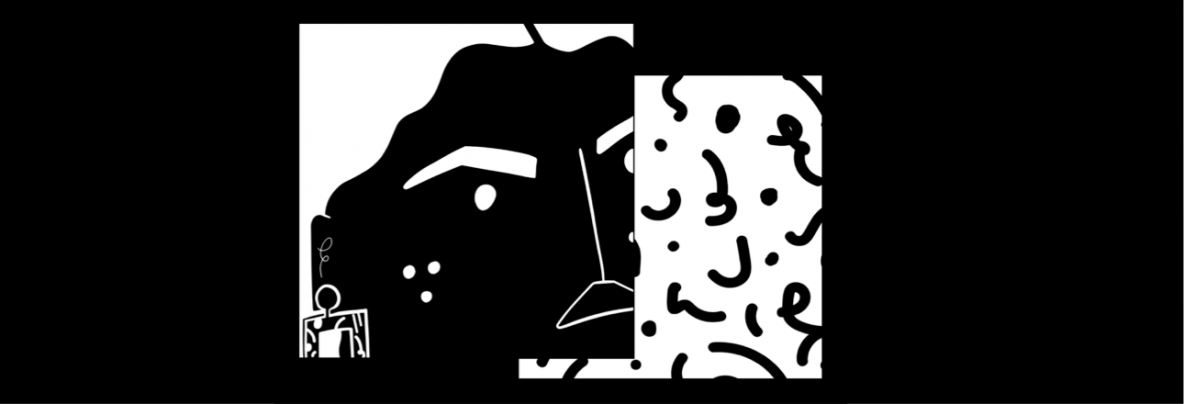Has Political Correctness gone mad?
Why a dismissal of political correctness is a denial of social progress
By Lena Blacker

Illustration by Niamh Power
OK, so, you’re not racist (or sexist), but…
Comedy used to be so much better when we could say what we liked! Whatever happened to free speech? You can’t say anything these days… I’m gonna share a Facebook post calling them all snowflakes, that’ll show ‘em.
The Cambridge Dictionary defines someone who is 'politically correct' as:
"Someone who believes that language and actions that could be offensive to others, especially those relating to sex and race, should be avoided."
Yet a quick google image search reveals pages of satirical illustrations deeming political correctness to be a term "used for whiney oversensitive pansies who need everything sugar-coated for them". Or that it's "fascism with manners", implicating that it strips us of our right to free speech. It's clear that the term 'political correctness' arouses distaste in much of the British public, and its not hard to see why.
Up until the last decade casual (and often explicit) racist and sexist humour provided, or at least contributed, to foundations of many friendships, pub gags, TV shows, films and comics. And suddenly, the millennial generation has arrived and with them a rejection of all of this in the name of ‘political correctness’... doesn’t seem fair does it?
In actual fact, it’s more fair than ever - whilst the white and privileged sacrifice humour built on the ancient, and unfortunately prevalent, principle of Empire (a deeply entrenched assumption of superiority), more voice and freedom is given to minority communities, little by little. It all comes down to compassion and education; a deeper understanding of where these remarks come from, and why in fact there is no level of dark humour that excuses the deep hurt and feelings of prejudice they may stir within the recipient.
You may remark whilst reading this that you are a person of colour, a member of the LGBTQ+ community, womxn or other, and that you are not usually offended. Or you may argue that many of your friends are equally unbothered. But why risk hurting even a few for the sake of a three-minute joke or comment? These remarks, labels and jokes do much more damage below surface level: it’s not just whom they may hurt or offend in the moment, but a perpetuation of harmful stereotypes that subconsciously contributes to wider issues of racism and discrimination.

Freedom of speech is a marker of progress and a democratic society, but it is also a responsibility.
What good is freedom of speech if all it stands for is to harm others for the sake of being able to voice anything offensive that comes into your mind? Then we’re back to square one and it’s not really a progressive society at all. As defined by the Harm Principle, ‘"No-one should be forcibly prevented from acting in any way he chooses, provided his acts are not invasive of the free acts of others” (Ronald Hamowy, The encyclopaedia of Libertarianism, 2008).
It is easy to forget the power of language; as a society we are constantly in denial of how words affect us: "sticks and stones may break my bones, but words will never hurt me". But the truth is, you'll always remember that time Mark from swimming club called you ugly in Year 3, or when a so-called friend commented on the 'abnormal' size of your thighs. Imagine how much worse this must feel, when a word loaded with historical significance and prejudice is thrown at you in the same casual manner.
I am no perfect moral example either; I am white, undoubtedly ‘privileged’, and still have a lot to learn. And here’s the thing: as someone in this position, I have no right to define what offends any other minority group - because systematic racial prejudice is something I will never experience. So after all of the pain and suffering caused historically by my race, how can I have the audacity to turn around and deny minority communities a status of equality as a result of my so-called ‘freedom of speech’? And yes, we must move on from our colonial past, but we can only do so through learning from it.
In watching a programme that reviewed the success of the 90s sketch show ‘Goodness Gracious Me’, the infamous ‘Going for an English’ sketch roused some distaste in a few family members; ‘Well actually I find this a bit offensive!’ one quips, while another claims that ‘This is an exaggeration! Nobody is really like that towards Indians!’ Of course, this exact reaction is the one the programme aimed to challenge - I couldn’t quite believe that the point was being missed - that this situational reversal was a blatant depiction of the way that minority groups - in this case the Indian community, was, and often still is, treated within British society.
Perhaps the political rhetoric around Brexit and Trump has encouraged this discourse; a return to ‘traditional values’ and ‘classic humour’. Extreme opinion articles and fake statistics permeate these social media spheres and contaminate our perception of what really matters.
Nobody likes to be made to feel uncomfortable, or to realise that they’ve caused harm to others through their speech or actions, but we have a responsibility to improve our society, to encourage and be aware of social progress and not belittle it to the dismantling of our quintessential British humour. ‘Freedom of speech’ is often twisted into this notion of having the ‘right to offend’ - where this 'right', should not, and does not, exist.
Could it be then, that the term itself 'politically correct' now holds its own negative stereotype; used to call out seemingly unimportant minor issues? Maybe a reform of the term is needed, or maybe, we should just pay more attention to the language we use, so that we can work together to create a more harmonious society.
Art by
Words by
Share this article

